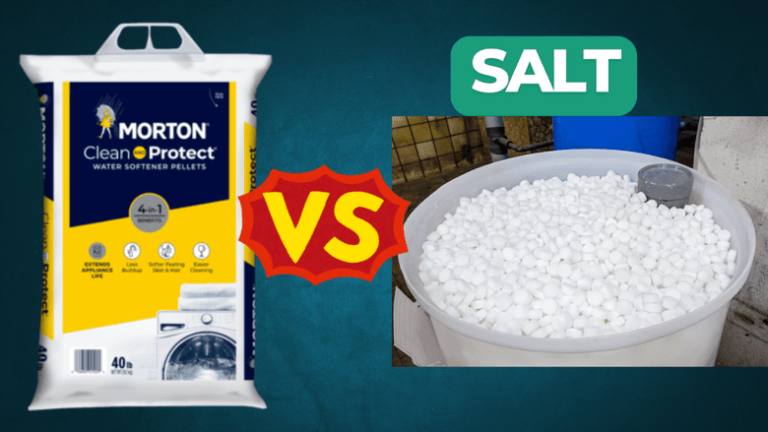Will Water Softner Salt Keep Roots Out of Septic Pipes?
Imagine you've just discovered tree roots invading your septic pipes, causing backups and costly repairs. You might wonder if water softener salt could be a quick fix to keep those roots at bay. However, while it's effective for mineral buildup, it doesn't actually prevent root intrusion. So, what are the real solutions to protect your septic system? Understanding the dynamics between tree roots and septic systems is essential, and you might be surprised by the alternatives available.
Key Takeaways
- Water softener salt does not prevent tree roots from invading septic pipes; its primary function is to soften hard water.
- Roots are attracted to moisture and nutrients, not influenced by the presence of salt in the septic system.
- Regular maintenance and inspections are essential to detect and manage root intrusion effectively.
- Chemical root killers and root barriers are more effective solutions for preventing root invasion in septic systems.
- Overuse of water softener salt can disrupt the bacterial balance in septic tanks, negatively impacting system health.
Understanding Septic Systems
Septic systems play an essential role in managing wastewater for homes not connected to municipal sewage lines. To guarantee your system operates efficiently, you need to prioritize septic tank maintenance. Regular pumping is vital; typically, you should do this every three to five years. If you neglect this, solid waste can accumulate, leading to clogs and costly repairs.
Pay attention to your leach field health as well. This area filters and disperses the effluent from your septic tank into the soil. If the leach field becomes saturated or damaged, it can result in backups and unpleasant odors.
You can promote leach field health by avoiding heavy traffic over this area and steering clear of planting trees or shrubs nearby, as their roots can infiltrate and disrupt the system.
Be mindful of what you flush down your toilets and pour down your drains. Chemicals and non-biodegradable items can harm your septic system's balance, leading to failures.
The Role of Water Softener Salt
When managing your home's water system, you mightn't think about how water softener salt can impact your septic system. Water softener benefits extend beyond just improving the quality of your water; they can also influence the health of your septic system. By softening hard water, you reduce mineral buildup in pipes, which can lead to clogs and backups.
However, it's important to take into account the salt application methods you use. The way you apply water softener salt can affect how much sodium enters your septic system. If you overuse salt, it can disrupt the delicate balance of bacteria in your septic tank, which are essential for breaking down waste.
To maximize water softener benefits while protecting your septic system, stick to recommended salt application methods. Regular maintenance of both your water softener and septic system is critical.
You'll want to monitor salt usage and verify your septic tank is pumped out periodically. By doing so, you can enjoy the advantages of softened water without compromising your septic system's functionality.
How Tree Roots Invade Pipes
Tree roots often invade pipes, causing significant damage and costly repairs. When you think about it, this tree root invasion can lead to a series of frustrating issues that you'd rather avoid.
Here's what you might face:
- Clogged Pipes: Roots can obstruct your plumbing, leading to slow drains and backups that disrupt your daily routine.
- Pipe Damage: As roots grow, they can crack or break pipes, resulting in leaks that can wreak havoc on your property.
- Expensive Repairs: Fixing the damage caused by root invasions often requires digging up your yard and replacing pipes, which can quickly drain your wallet.
These invasions occur because tree roots naturally seek moisture and nutrients. If there's even a small crack or joint in your pipes, roots will invade, growing into the system and creating chaos.
It's crucial to be proactive and monitor your plumbing to prevent these issues. By understanding how tree roots invade pipes, you can take steps to protect your home from potential pipe damage and save yourself from the emotional and financial toll of repairs.
Effectiveness of Water Softener Salt
Water softener salt has unique chemical properties that can influence various aspects of your plumbing system.
You might be surprised to learn how it impacts root growth and interacts with your septic system.
Understanding these effects can help you make better choices for your home's maintenance.
Salt's Chemical Properties
Throughout history, salt has played an essential role in various chemical processes, particularly in water softening. Sodium chloride, commonly known as table salt, has unique ionic properties that make it effective in this process.
When you use water softener salt, you're not just adding sodium chloride to your water system; you're changing the way water interacts with minerals.
Here are three emotional benefits of using water softener salt:
- Better Skin: Softened water can leave your skin feeling smoother and less dry, enhancing your bathing experience.
- Longer-Lasting Appliances: Using water softener salt helps reduce mineral buildup in your pipes and appliances, extending their lifespan.
- Easier Cleaning: You'll notice fewer water spots on your dishes and fixtures, making cleaning tasks less frustrating.
The ionic properties of sodium chloride allow it to bind with hard minerals like calcium and magnesium, effectively removing them from your water.
This process not only improves your water quality but also minimizes potential damage to your plumbing system.
Impact on Root Growth
The effectiveness of water softener salt can considerably influence root growth in plants, leading to healthier gardens and landscapes. When you use water softener salt, it alters the sodium levels in the soil, which can affect how plants absorb nutrients and moisture. High sodium levels may hinder root growth, as plants struggle to draw in essential resources when soil moisture is compromised.
If you're not careful, excessive salt can lead to a condition known as soil salinity. This creates an environment where roots may not thrive, as they require a certain balance of nutrients and moisture to grow effectively. Conversely, when used in moderation, water softener salt can help improve soil structure, allowing for better drainage and root penetration.
It's crucial to monitor the soil's condition regularly. You might consider performing soil tests to assess salinity levels and confirm that you're not stunting root growth.
Ultimately, the key lies in finding the right balance, so your plants can flourish while managing the potential impact of water softener salt on soil moisture and overall health. Keeping these factors in mind will help you maintain a vibrant garden.
Septic System Interactions
When considering how water softener salt interacts with your septic system, it's essential to understand its potential effects on the microbial balance within the tank. High levels of salt can disrupt the natural bacteria that break down waste, which is vital for proper septic tank maintenance.
This disruption can lead to a variety of issues, including:
- Slower waste breakdown – If bacteria struggle to thrive, waste won't decompose as efficiently.
- Increased risk of backups – Blockages may occur, causing sewage to overflow and create costly repairs.
- Compromised root growth prevention – While salt may deter some roots, its impact on the tank's ecosystem could ultimately worsen your root problem, leading to more intrusive roots.
You might think that water softener salt offers an easy solution for keeping roots at bay, but the reality is more complex.
If you want a truly effective approach, consider alternative methods for root growth prevention that won't jeopardize your septic system's health. Balancing the need for water softening while ensuring your septic system operates efficiently is key to long-term success.
Alternative Methods for Root Prevention
If you're looking to prevent roots from invading your septic system, several effective options are available.
You can consider using chemical root killers, installing root barriers, or maintaining your pipes regularly.
Each of these methods can help protect your plumbing and keep everything running smoothly.
Chemical Root Killers
Dealing with pesky tree roots invading your plumbing can be frustrating, but chemical root killers offer an effective solution.
These chemical treatments can help you manage root growth and protect your septic system from costly damage. When considering these options, keep in mind the benefits they provide:
- Quick Action: Chemical root killers work fast, breaking down root masses and preventing further growth.
- Cost-Effective: Compared to digging and replacing pipes, using chemical treatments can save you money in the long run.
- Easy Application: Most products are simple to use, allowing you to tackle root management without needing a professional.
Using these products regularly can help you maintain a healthy plumbing system.
However, it's important to follow the instructions carefully to avoid harming nearby plants or the environment.
While chemical root killers are a powerful tool, they should be part of an overall root management plan that considers the health of your landscaping.
Combining these treatments with preventative measures will keep your plumbing free from invasive roots and guarantee your septic system runs smoothly.
Root Barrier Installation
Installing root barriers can be an effective way to prevent tree roots from invading your septic pipes and plumbing system. These barriers serve as a physical shield, blocking roots from reaching your pipes and causing costly damage.
To get started, you'll need to choose appropriate root barrier materials. Options include plastic sheeting, metal barriers, or even concrete, depending on your specific needs and local regulations.
When it comes to installation techniques, make certain to dig a trench around the affected area, ideally at least 2-3 feet deep. This depth guarantees that roots can't simply grow over the barrier.
Position your chosen material vertically in the trench, with the top edge slightly above ground to discourage root growth from above. Backfill the trench carefully to avoid disturbing the barrier.
You can also consider installing the barrier around the entire perimeter of your septic system for extra protection.
Don't forget to periodically check the barriers for any signs of wear or damage. By taking these proactive steps, you can greatly reduce the risk of roots invading your septic pipes, guaranteeing a healthier and more efficient plumbing system.
Regular Pipe Maintenance
While root barriers are a solid option for preventing tree roots from invading your septic pipes, regular pipe maintenance is equally essential in keeping your plumbing system healthy.
You can't underestimate the importance of staying proactive. Here are three crucial practices you should adopt:
- Pipe Inspections: Schedule regular inspections to catch potential issues early. A professional can identify weak spots or blockages that might attract roots.
- Routine Cleaning: Clean your pipes regularly to remove debris and buildup. This helps maintain proper flow and reduces the likelihood of attracting roots.
- Monitor Surrounding Trees: Keep an eye on the trees near your septic system. Trim back branches and roots when necessary to minimize their reach.
Potential Risks of Using Salt
Many homeowners may not realize that using salt in water softeners can pose potential risks to their septic systems. When you add salt to your water softener, it doesn't just soften your water; it can also lead to salt toxicity in your septic tank. High levels of sodium can disrupt the delicate balance of bacteria essential for breaking down waste. Without these bacteria functioning properly, your septic system's efficiency can greatly decrease, potentially leading to costly repairs.
Beyond the immediate effects on your septic system, there's also the environmental impact to reflect on. Excess salt can leach into the groundwater, affecting local water supplies and harming plants and aquatic life. If you live in an area with sensitive ecosystems, the consequences can be even more severe.
In short, while salt might seem like a convenient solution for softening water, it's important to evaluate these potential risks against the benefits. You may want to explore alternative water softening methods that are easier on your septic system and the environment, ensuring the long-term health of both.
Best Practices for Septic Maintenance
To keep your septic system running smoothly, regular maintenance is essential. Neglecting your system can lead to costly repairs and even health hazards. Here are three best practices to guarantee your septic system stays in top shape:
1. Schedule Regular Septic Tank Inspections****: Have a professional check your septic tank every 1 to 3 years. This helps catch any issues before they escalate, saving you time and money.
2. Practice Proper Drain Field Care**: Avoid parking or driving** over your drain field. This can compact the soil and damage the pipes.
Keep the area clear of debris and plant only grass or shallow-rooted plants to prevent root intrusion.
3. Be Mindful of What Goes Down the Drain: Avoid flushing non-biodegradable items, chemicals, or excessive fats.
These can disrupt the balance of bacteria needed for proper breakdown, leading to system failures.
Professional Solutions for Root Issues
Roots from nearby trees and shrubs can wreak havoc on your septic system, leading to blockages and costly repairs. If you're facing root growth issues, professional solutions are vital to protect your investment and maintain the efficiency of your septic system.
First, consider hiring a licensed plumber or septic expert who specializes in root intrusion problems. They can assess the situation and recommend the best septic solutions tailored to your needs.
Two common methods include hydro-jetting and root cutting. Hydro-jetting uses high-pressure water to clear out any roots and debris, restoring your pipes' flow. Root cutting, on the other hand, involves mechanically removing roots from the pipes to prevent further damage.
Additionally, professionals can apply root growth inhibitors to create a barrier against future infestations. These treatments can help you avoid recurring issues, saving you both time and money in the long run.
Taking proactive steps with professional help guarantees that your septic system remains functional and efficient.
Don't wait for a major blockage to occur; addressing root growth issues early on can prevent costly repairs down the line.
Frequently Asked Questions
Can Water Softener Salt Harm Beneficial Bacteria in Septic Systems?
Water softener salt can disrupt your septic health by harming the bacteria balance. If you introduce too much salt, it may inhibit the beneficial bacteria that break down waste, leading to potential system issues.
How Often Should I Add Salt to My Water Softener?
Like clockwork, your water softener needs attention. For ideal water softener maintenance, check salt levels monthly. Depending on usage, you might need to add salt every 4 to 6 weeks for proper salt dosage frequency.
Will Salt Affect the Soil Around My Septic System?
Salt can impact soil around your septic system. The salt-soil interaction may affect nutrient absorption and microbial activity, potentially compromising septic system health. Monitor salt usage to maintain balance for ideal soil and septic performance.
What Are the Signs of Tree Roots in Septic Pipes?
Tree root invasion's a troubling threat! If you notice slow drains, gurgling sounds, or sewage backup, it's time for septic system maintenance. Detecting these signs early can save you from costly repairs later.
Can I Use Water Softener Salt for Other Plumbing Issues?
You can't use water softener salt for other plumbing issues effectively. While it serves its purpose for softening water, consider exploring plumbing alternatives that target specific problems, as salt effectiveness varies greatly depending on the situation.
Conclusion
In short, water softener salt won't keep roots out of your septic pipes. Just like trying to use a band-aid on a broken leg, it won't solve the real problem. Instead, focus on preventive measures like root barriers and regular maintenance. With the right approach, you can protect your septic system from invasive roots and avoid costly repairs down the line. Remember, a little foresight can save you from a big mess later on!







